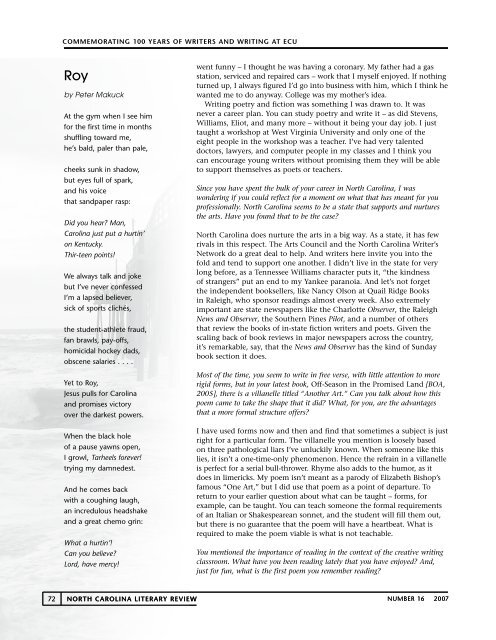NORTH CAROLINA LITERARY REVIEW Number 16 - Peter Makuck
NORTH CAROLINA LITERARY REVIEW Number 16 - Peter Makuck
NORTH CAROLINA LITERARY REVIEW Number 16 - Peter Makuck
Create successful ePaper yourself
Turn your PDF publications into a flip-book with our unique Google optimized e-Paper software.
CommemoratiNg 100 years of writers aNd writiNg at eCu<br />
Roy<br />
by <strong>Peter</strong> <strong>Makuck</strong><br />
At the gym when I see him<br />
for the first time in months<br />
shuffling toward me,<br />
he’s bald, paler than pale,<br />
cheeks sunk in shadow,<br />
but eyes full of spark,<br />
and his voice<br />
that sandpaper rasp:<br />
Did you hear? Man,<br />
Carolina just put a hurtin’<br />
on Kentucky.<br />
Thir-teen points!<br />
We always talk and joke<br />
but I’ve never confessed<br />
I’m a lapsed believer,<br />
sick of sports clichés,<br />
the student-athlete fraud,<br />
fan brawls, pay-offs,<br />
homicidal hockey dads,<br />
obscene salaries . . . .<br />
Yet to roy,<br />
Jesus pulls for Carolina<br />
and promises victory<br />
over the darkest powers.<br />
When the black hole<br />
of a pause yawns open,<br />
I growl, Tarheels forever!<br />
trying my damnedest.<br />
And he comes back<br />
with a coughing laugh,<br />
an incredulous headshake<br />
and a great chemo grin:<br />
What a hurtin’!<br />
Can you believe?<br />
Lord, have mercy!<br />
72 North CaroliNa literary review<br />
went funny – I thought he was having a coronary. My father had a gas<br />
station, serviced and repaired cars – work that I myself enjoyed. If nothing<br />
turned up, I always figured I’d go into business with him, which I think he<br />
wanted me to do anyway. College was my mother’s idea.<br />
Writing poetry and fiction was something I was drawn to. It was<br />
never a career plan. You can study poetry and write it – as did Stevens,<br />
Williams, Eliot, and many more – without it being your day job. I just<br />
taught a workshop at West Virginia University and only one of the<br />
eight people in the workshop was a teacher. I’ve had very talented<br />
doctors, lawyers, and computer people in my classes and I think you<br />
can encourage young writers without promising them they will be able<br />
to support themselves as poets or teachers.<br />
Since you have spent the bulk of your career in North Carolina, I was<br />
wondering if you could reflect for a moment on what that has meant for you<br />
professionally. North Carolina seems to be a state that supports and nurtures<br />
the arts. Have you found that to be the case?<br />
North Carolina does nurture the arts in a big way. As a state, it has few<br />
rivals in this respect. The Arts Council and the North Carolina Writer’s<br />
Network do a great deal to help. And writers here invite you into the<br />
fold and tend to support one another. I didn’t live in the state for very<br />
long before, as a Tennessee Williams character puts it, “the kindness<br />
of strangers” put an end to my Yankee paranoia. And let’s not forget<br />
the independent booksellers, like Nancy Olson at Quail Ridge Books<br />
in Raleigh, who sponsor readings almost every week. Also extremely<br />
important are state newspapers like the Charlotte Observer, the Raleigh<br />
News and Observer, the Southern Pines Pilot, and a number of others<br />
that review the books of in-state fiction writers and poets. Given the<br />
scaling back of book reviews in major newspapers across the country,<br />
it’s remarkable, say, that the News and Observer has the kind of Sunday<br />
book section it does.<br />
Most of the time, you seem to write in free verse, with little attention to more<br />
rigid forms, but in your latest book, Off-Season in the Promised Land [BOA,<br />
2005], there is a villanelle titled “Another Art.” Can you talk about how this<br />
poem came to take the shape that it did? What, for you, are the advantages<br />
that a more formal structure offers?<br />
I have used forms now and then and find that sometimes a subject is just<br />
right for a particular form. The villanelle you mention is loosely based<br />
on three pathological liars I’ve unluckily known. When someone like this<br />
lies, it isn’t a one-time-only phenomenon. Hence the refrain in a villanelle<br />
is perfect for a serial bull-thrower. Rhyme also adds to the humor, as it<br />
does in limericks. My poem isn’t meant as a parody of Elizabeth Bishop’s<br />
famous “One Art,” but I did use that poem as a point of departure. To<br />
return to your earlier question about what can be taught – forms, for<br />
example, can be taught. You can teach someone the formal requirements<br />
of an Italian or Shakespearean sonnet, and the student will fill them out,<br />
but there is no guarantee that the poem will have a heartbeat. What is<br />
required to make the poem viable is what is not teachable.<br />
You mentioned the importance of reading in the context of the creative writing<br />
classroom. What have you been reading lately that you have enjoyed? And,<br />
just for fun, what is the first poem you remember reading?<br />
<strong>Number</strong> <strong>16</strong> 2007


